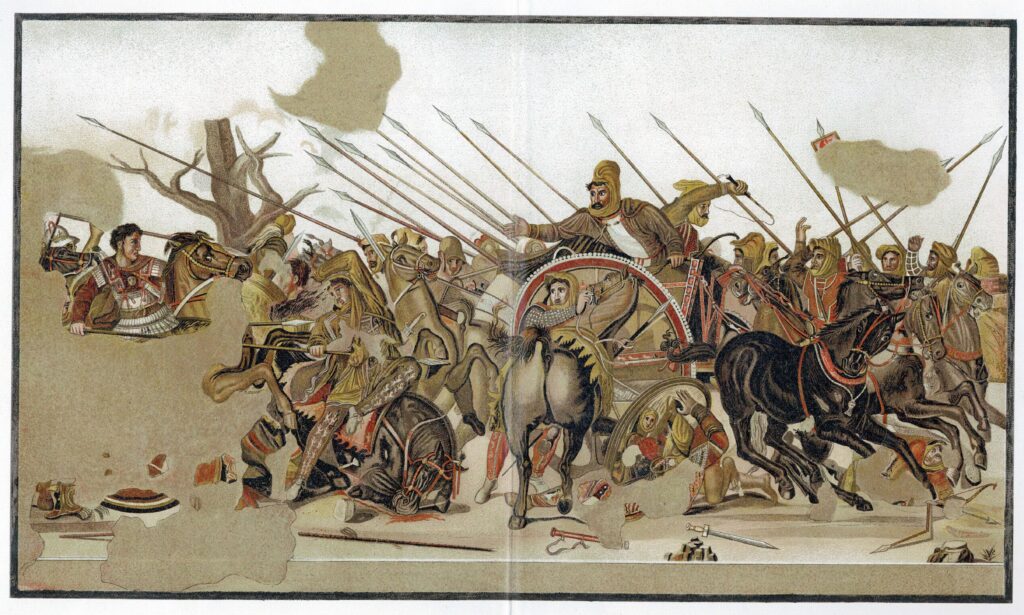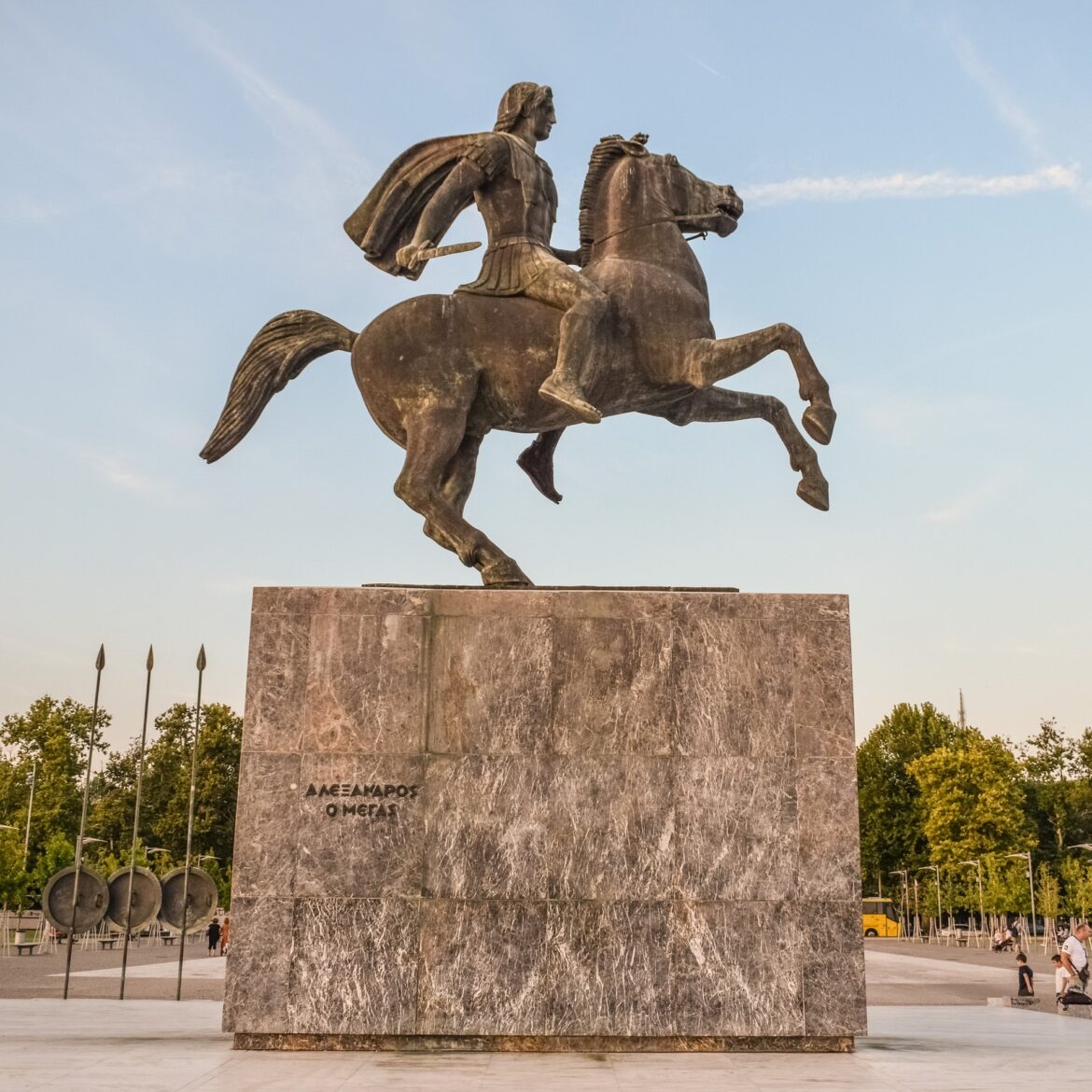Introduction
Alexander the Great is a fascinating historical figure whose legacy continues to influence the modern world. In this blog, we will provide an overview of Alexander’s life and legacy, his time in Macedon to ruling the “known world”. This post is going to be the launch point for a series of posts that explore every facet of Alexander’s life and contribution to the world. Alexander the Great is a Legendary Figure and there is a lot of material exploring his life. This is meant to be a bite sized look at his life, be sure to come back to see as more posts are published in this series until Alexander is fully fleshed out.

Early Life and Education
Alexander the Great was born in 356 BCE in Pella, the capital of the ancient kingdom of Macedon, located in modern-day Greece. Alexander’s life was greatly influenced by his father, King Philip II of Macedon, who in his own right was a powerful ruler. Phillip had unified Macedon, reorganized the Macedonian Army into the lethal machine that Alexander would use, and established Macedon as a major power in the region. Alexander’s mother was Queen Olympia, a member of the royal family of Epirus, a kingdom just to the west of Macedon along the coast. We will explore Philip in greater detail in his own series, as his actions directly lead to Alexander’s greatness and the spread of Hellenistic culture across the near East.
From a young age, Alexander was tutored by the Aristotle, who taught him a wide range of subjects, including philosophy, literature, and science. Alexander was an avid student and had a thirst for knowledge. He was particularly interested in the works of Homer, and his love for the epic poems of the Iliad and the Odyssey would stay with him throughout his life. Alexander’s fascination with the works of Homer created an obsession for the Greek Hero Achilles. Alexander believed himself to be the direct descendent of Achilles, this undoubtedly fueled Alexander’s drive for military success.
Military Career
Alexander’s pursuit of Achilles began when he was just 16 years old. His father left him in charge of Macedon while away on a military campaign. During this time, Macedon was invaded by a Thracian Army, Alexander successfully defended Macedon from the invasion, demonstrating his military prowess.
Alexander’s first major military campaign was against the city-state of Thebes, which had rebelled against Macedonian rule. Alexander marched on Thebes and laid siege to the city. Thebes was one of the most powerful cities of the time. Alexander laid siege to Thebes for three weeks, finally breaching the walls and routing the defenders. Alexander ordered the city be razed and the inhabitants sold into slavery. This brutal campaign sent a message to the rest of Greece that Alexander was a powerful and ruthless leader.
When King Philip was assassinated in 336 BCE, Alexander became king of Macedon at the age of 20. His recently acquired position was quickly under siege, he had quickly moved to secure his position, executing those who had opposed his father’s rule and consolidating his power over the kingdom.
With Greece under his control, Alexander turned his attention to the center of the world, the Persian Empire. The Persian Empire at this time is one of the largest and wealthiest empires in the world at the time. In 334 BCE, he led an army of around 40,000 men across the Hellespont into Asia Minor, beginning his famous campaign against the Persians, Alexander would never return to Macedon.
Military Strategies
Alexander’s military strategies were innovative and effective, earning him a reputation as one of the greatest military commanders in history. One of his most famous tactics was the use of the Macedonian phalanx, a formation of soldiers armed with long spears called sarissas. The phalanx was an incredibly effective formation, which had been around for hundreds of years. Philip, Alexander’s father revolutionized the Macedonian army by giving them longer spears, breaking the army into smaller units each with capable commanders and officers, and including special units like calvary and archers to ensure the phalanx was able to operate at its most efficient, a head on fight. This allowed Alexander’s army to advance and overpower enemy forces with ease.
One Alexander’s key strategies was his use of cavalry. He had a highly skilled cavalry force, which he used to great effect in battle. Alexander himself was an accomplished horseman and often led his cavalry charges from the front.
Alexander was also known for his bold and aggressive tactics. He was not afraid to take risks and often launched surprise attacks against his enemies, catching them off guard and forcing them to retreat. Learning from Alexander we can see how powerful being aggressive and active is always the preferable strategy and can be applied in our own lives, aggressively attacking obstacles gave Alexander the ability to dictate the terms of his engagements.
Relationships with Other Historical Figures
Throughout his military career, Alexander formed relationships with a number of other historical figures. One of his closest friends was Hephaestion, a fellow Macedonian who served as Alexander’s second-in-command. Hephaestion was with Alexander throughout his campaigns, and the two men were said to be inseparable. We will discuss Hephaestion in detail later in this series as he played a key role in Alexander’s sucesses.
Another important figure in Alexander’s life was his mother, Queen Olympia. Olympia was a powerful and influential figure in Macedon, and she played a key role in shaping Alexander’s early life and education.
Alexander also had a complex relationship with his father, King Philip. While the two men shared a close bond, they also had their differences, particularly when it came to Alexander’s ambitions and desire for glory.
During his campaigns in Persia, Alexander encountered a number of other historical figures, including the Persian king Darius III and the legendary queen of Egypt, Cleopatra VII. Alexander defeated Darius in several key battles, ultimately leading to the collapse of the Persian Empire. His relationship with Cleopatra is less clear, as there is little historical evidence to suggest that the two ever met in person.
Legacy
Alexander’s legacy is still felt today, both in the ancient world and in modern times. He was a skilled military commander who conquered vast territories, and his campaigns had a profound impact on the ancient world.
One of the most significant legacies of Alexander’s reign was the spread of Greek culture throughout the Mediterranean world. As Alexander’s armies marched across Persia and into India, they brought with them the Greek language, religion, and culture. This process of cultural exchange is known as Hellenization, and it had a lasting impact on the societies of the world. Alexander’s successor kingdom’s lived into the Roman Empire and even fought against the Chinese Empire.
Alexander’s conquests also had a significant impact on the political landscape of the ancient world. By defeating the Persian Empire, Alexander established Macedonian dominance over much of the Near East and Central Asia. His campaigns paved the way for the rise of the Hellenistic kingdoms, which were ruled by Alexander’s former generals and became major powers in their own right.
Alexander’s legacy is also felt in the field of philosophy. His close relationship with Aristotle and his own interest in philosophy helped to shape the way that later generations thought about the world. His reign also marked the beginning of the Hellenistic period, which saw the development of new philosophical schools, including Stoicism and Epicureanism.
Deeper Readings:
- “Alexander the Great” by Philip Freeman
- “Alexander: A History of the Origin and Growth of the Art of War from the Earliest Times to the Battle of Ipsus, B.C. 301, with a Detailed Account of the Campaigns of the Great Macedonian” by Theodore Ayrault Dodge
- “Alexander of Macedon, 356-323 B.C.: A Historical Biography” by Peter Green
- “The Campaigns of Alexander” by Arrian
- “Alexander the Great: A Very Short Introduction” by Hugh Bowden
- “Alexander the Great and the Hellenistic Age” by Jeremy McInerney and the Great Courses
- “The Genius of Alexander the Great” by N.G.L. Hammond
- “Alexander the Great: A New History” by Waldemar Heckel

0 comment
[…] history. Known for his military conquests and the spread of Greek culture across the ancient world. We discussed this in an overview earlier. Born in 356 BCE as the son of King Philip II of Macedon, Alexander was educated by the philosopher […]